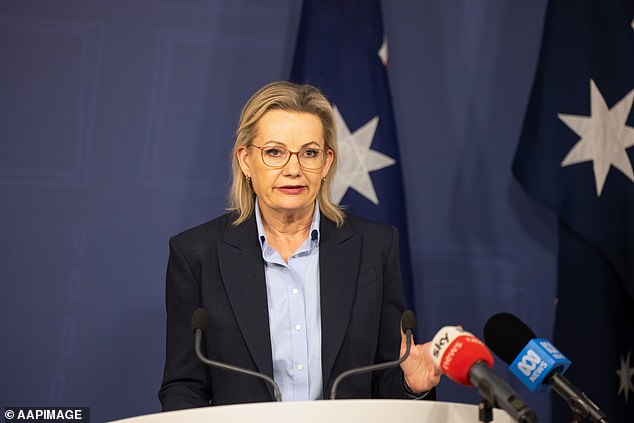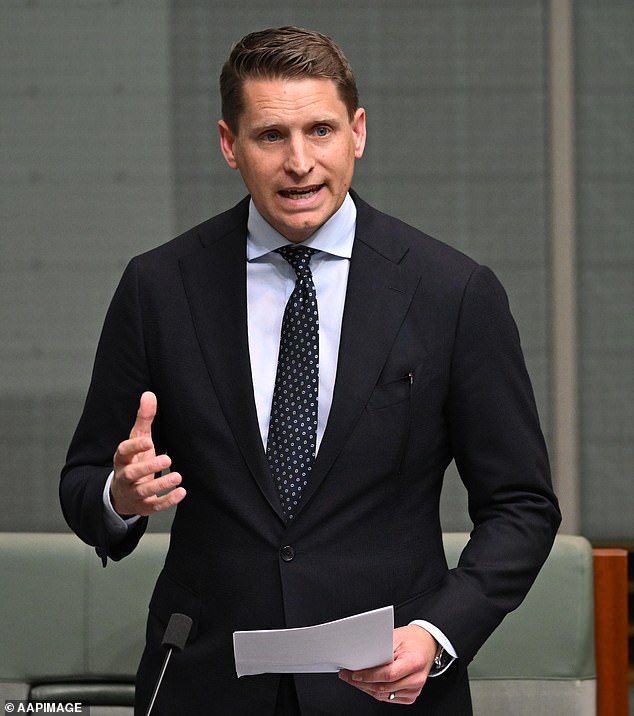If Andrew Hastie decides to challenge for the leadership of the Liberal Party in the final parliamentary sittings before the end of the year, he will do so with the backing of key moderates.
If he can also secure the support of the right, Sussan Ley will be rolled as leader, replaced by Hastie. That is the emerging reality inside the Liberal party room, whether anyone is prepared to admit it publicly yet or not.
What has crystallised over the weekend is a view among moderates – one of the two key factions of the party – that Ley’s leadership is finished.
The moderates have reached the point where they are prepared, in principle, to support a socially conservative former SAS officer as leader.
They are ready to bypass conservative leader-in-waiting Angus Taylor, and end what they see as a period of drift and mismanagement under Ley.
The Daily Mail has spoken to key moderates who have confirmed that if Hastie challenged Ley for the leadership, he would have their support.
‘He just needs to bring his own conservative colleagues with him,’ one moderate said.
Another added: ‘Ley didn’t dance with those who brought her so we are moving on.

A key Liberal moderate told the Daily Mail: ‘We have reached the point where radical change is necessary’
‘Even if it’s Hastie, that’s better than a leader that stands for nothing.’
A third said: ‘We have reached a point where radical change is necessary.
‘Hastie isn’t my cup of tea, but he can have his go and if he’s right our polls will improve.
‘But if he’s wrong we need to reassess the decisions already made.’
How the moderates reached breaking point
The breaking point for the moderates has been the handling of net zero and the re-emergence of coal as the Coalition’s preferred energy source.
Dumping the formal 2050 net zero target was always going to be contentious. Doing it in a way that leaves the party in a position where it has to claim it still believes in the spirit of the Paris agreement on climate change, while marching visibly in the opposite direction, has compounded the problem.
The party’s internal process was chaotic, the messaging confused, and the political logic incoherent.
Ley did not demonstrate that she shaped the party’s decision, leaving moderates dissatisfied.

The leakers are essentially telling Andrew Hastie that it’s time to put up or shut up – and that this may be his only shot
It has come to a point where they want a clean break and are prepared to give Hastie his time as leader now, to prove he can win the support of voters, or fail and be found out.
Moderates have spent years warning about the electoral cost of inaction on climate. They watched colleagues lose once safe Liberal seats in the inner suburbs, watching their numbers diminish.
They have seen the party’s primary vote stagnate or decline in areas where professional voters, younger families and women now see climate and integrity as threshold issues.
The renewed talk of coal has added insult to injury. However artfully couched in the language of keeping the lights on, the signal to voters in metropolitan seats is unmistakeable: the party is once again prioritising the comfort of its climate sceptics over the market realities of the energy transition.
Meanwhile, the conclusion of key moderates is that Ley has failed the most basic test of leadership: choosing a direction and persuading the party to follow it.
In their eyes, she tried so hard to avoid offending the right that she effectively left the field to them, then found herself bound to a compromise she did not shape and cannot credibly defend.
That is why some moderates no longer talk about whether she should stay, only about how and when she will go.
The decision to leak their intention to support a shift to Hastie is designed to send a message as much as it is designed to usher him into the role of opposition leader.

Andrew Hastie reposted this digitally edited image of himself celebrating the death of the Liberals’ net zero policy at the weekend. Hastie said: ‘So let the net zero zealots cry foul. My only regret is that we can’t collect their tears for desalination’
Crucially, the conversation about succession has shifted. For a long time Angus Taylor was treated as the obvious next option: a senior figure from the right, an economic conservative, supposedly capable of straddling the internal divides.
He narrowly lost the vote to Ley after the election defeat earlier this year. Only because moderates backed Ley.
But moderates now want to rule a line under the leadership fights of generations past.
That is why Hastie’s name matters. Moderates don’t believe he’ll succeed with his anti net zero quest, but they are prepared to give him his chance now, if he is prepared to ‘put his money where his mouth is’, as one moderate MP put it.
A calculated choice
The moderates swinging behind Hastie is not a natural ideological choice, but it is a calculated political one.
They are prepared to live with their differences on social issues and the environment if they believe he can at least impose discipline, provide clarity of purpose, and end the endless muddle on climate and energy.
If he can’t, they expect he will fall over before the next election, due in two-and-a-half years’ time.
Tonight’s leaks are not idle chatter. They are a deliberate test.
By making clear that Hastie would have significant moderate backing if he runs, they are effectively challenging him to live up to his own rhetoric.
A conviction politician, in their framing, cannot forever hover at the edge of the ring, talking about values while someone else throws the punches. At some point he has to decide whether he is content to be the party’s conscience or prepared to try to lead it.
Hastie’s public line so far has been loyalty to Ley and an insistence that he is not counting numbers. That buys him time, but only up to a point.
Once it is widely understood that he could win a ballot in the current climate, him being passive starts to look less like principle and more like reluctance to take a risk.
Colleagues will not say it publicly, but privately some are already framing the moment like this: if you truly believe the party has lost its way, and you are being invited to do something about it, what does it say about you if you refuse?
The arithmetic, as it is quietly described by those involved, is straightforward. With moderate support locked in at a critical mass, the only remaining question would be whether the right coalesces behind Hastie rather than Taylor or another figure.
If they do, Ley is finished in a single ballot. If they do not, the instability simply festers and her position erodes more slowly. Either way, the party room mood has shifted from uncertainty to inevitability about her eventual departure.
This is what makes the timing of the final sitting period so combustible. The last week of parliament provides a natural focal point. It is the moment when private doubts are usually translated into leadership action, or at least into firm positions about what should happen early in the new year.
Even if Hastie ultimately decides not to put his hand up before the summer recess, the deeper truth exposed by these conversations does not change. Once a significant chunk of moderates have mentally moved on from a leader, that leader is living on borrowed time if they don’t have the right’s backing, which Ley does not. She will not lead the Liberals to the next election. Inside the party, that is now the dominant view, even if it is not yet the public line.
What is playing out, in other words, is less a conventional leadership contest and more a test of character. The moderates have decided Ley has failed. They are now inviting Andrew Hastie to take over.
